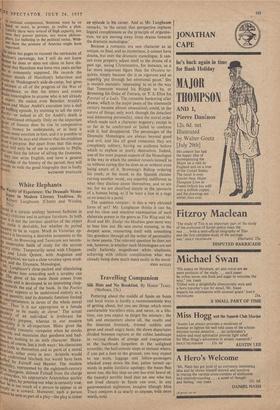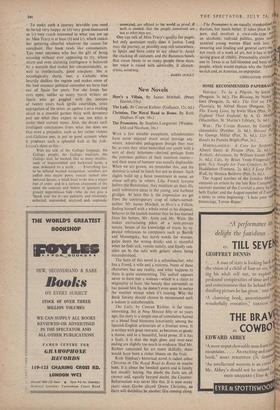Travelling Companion
Silk Hats and No Breakfast. By Honor Tracy. (Methuen, 15s.) Pottering about the middle of Spain on buses and local trains is hardly a recommendable way of getting about, but you see things which more comfortable travellers miss, and never, in a life- time, can you expect to forget the mixture : the talk and encounters above all, the smells and the itinerant livestock, trussed rabbits and geese and small angry hens; the dawn departures divided between rapture at the cubist landscape in varying shades of orange and exasperation at the hairbrush forgotten in the unlighted scramble; the half-minute stops at stations where, if you put a foot to the ground, you may expect to see train, luggage and fellow-passengers whisked away down the line, palms turned up- wards in polite fatalistic apology; the buses that never run, the bus stop no one has ever heard of, the (mostly) terrible food that no one who has not lived cheaply in Spain can ever, in any gastronomical nightmare, imagine (though Miss Tracy conjures it as nearly as anyone, with mere words, can).
To make such a journey bearable you need to be (a) very happy or (b) 'very good-humoured or (c) very much interested in what you are up to. Miss Tracy is at least (b) and (c), which makes her pottering cheerful whatever the causes for complaint. Her book reads like conversation. You meet someone who has the gift of being amusing without ever appearing to try, whose sharp and even alarming intelligence is balanced by a warmth that makes her companionably, as well as intellectually, good company. She is sociologically sharp, too; a Catholic who heartily dislikes the regime and makes some of the best amateur political comment we have had out of Spain for years. For she keeps her eyes open, unlike so many travel writers on Spain who go goggled with the notions of twenty years back (grille courtships, strict segregation of the sexes, an ageless Lorca reading aloud in a moonlit garden thick with devotees) and see what they expect to see, not what is under their current noses. Also, she draws such intelligent conclusions from what she does see that even a prejudice, such as her rather violent anti-Galician one, is put to good account when it produces such a splendid kick at the folk- lorista's shins as this : With his talk of the Gallego language, the Gallego people, the Gallego tradition, the Gallego soul, he seemed, like so many intellec- tuals of impoverished and backward lands, a man dedicated to a myth. . . Everything has to be inflated beyond recognition, versifiers are puffed into major poets, rascals turned into national heroes, a small local to-do into a major feat of arms: and in a curious abasement of the mind the customs and beliefs of ignorant and grossly superstitious folk—who do not give a 'thank you' for it—are patiently and reverently collected, expounded, analysed and, copiously
• annotated, are offered to the world as proof, if such is needed, that the people concerned are not as other men are.
One can talk of Miss Tracy's quality for pages. but only quotation really does it justice. Long may she journey, or possibly stop still somewhere, in Spain and have more to say about 'it. Amid the clacking of castanets and the flamenco howls that mean Spain to so many people these days, her voice is raised with admirable, if idiosyn- cratic, accuracy.
ISABEL QUICLY































 Previous page
Previous page